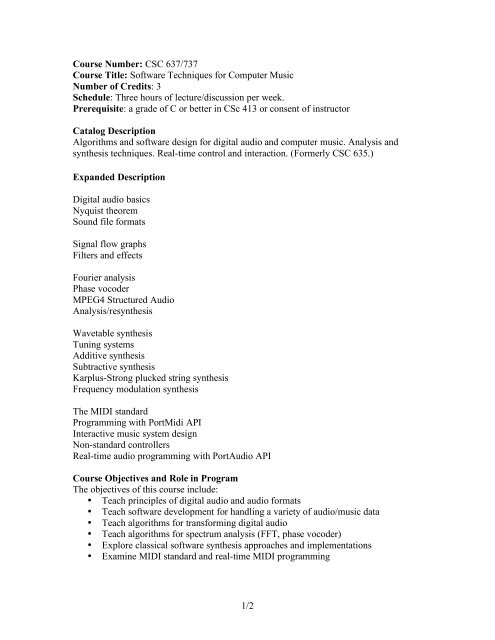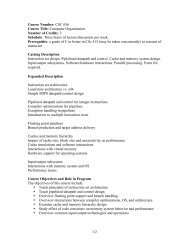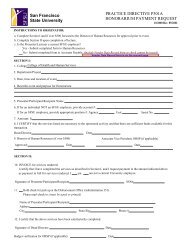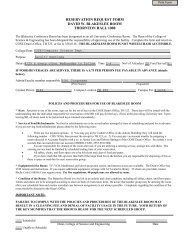1/2 Course Number: CSC 637/737 Course Title: Software ...
1/2 Course Number: CSC 637/737 Course Title: Software ...
1/2 Course Number: CSC 637/737 Course Title: Software ...
You also want an ePaper? Increase the reach of your titles
YUMPU automatically turns print PDFs into web optimized ePapers that Google loves.
<strong>Course</strong> <strong>Number</strong>: <strong>CSC</strong> <strong>637</strong>/<strong>737</strong><strong>Course</strong> <strong>Title</strong>: <strong>Software</strong> Techniques for Computer Music<strong>Number</strong> of Credits: 3Schedule: Three hours of lecture/discussion per week.Prerequisite: a grade of C or better in CSc 413 or consent of instructorCatalog DescriptionAlgorithms and software design for digital audio and computer music. Analysis andsynthesis techniques. Real-time control and interaction. (Formerly <strong>CSC</strong> 635.)Expanded DescriptionDigital audio basicsNyquist theoremSound file formatsSignal flow graphsFilters and effectsFourier analysisPhase vocoderMPEG4 Structured AudioAnalysis/resynthesisWavetable synthesisTuning systemsAdditive synthesisSubtractive synthesisKarplus-Strong plucked string synthesisFrequency modulation synthesisThe MIDI standardProgramming with PortMidi APIInteractive music system designNon-standard controllersReal-time audio programming with PortAudio API<strong>Course</strong> Objectives and Role in ProgramThe objectives of this course include:• Teach principles of digital audio and audio formats• Teach software development for handling a variety of audio/music data• Teach algorithms for transforming digital audio• Teach algorithms for spectrum analysis (FFT, phase vocoder)• Explore classical software synthesis approaches and implementations• Examine MIDI standard and real-time MIDI programming1/2
Students will work on projects implementing sound effects, simpleanalysis/transformation/resynthesis, and real-time MIDI parsing, material generation, andcontrol. A self-designed final programming project will integrate many aspects of thecourse material. For generality, the emphasis is on using low-level APIs that are crossplatformand open source. Competence in audio programming is essential in musicapplications, game development, digital media development and production, and manyweb applications.Learning OutcomesAt the end of this course students will be able to• Understand and implement digital sound effects• Develop and use spectrum analyzers• Implement low-level software synthesis operators• Implement classical sound synthesis algorithms• Develop code that works with real-time MIDI streams• Design applications that integrate music/audio informationMethod of EvaluationStudent learning will be evaluated on the basis of• Completeness and quality of programming assignments• Grade on two midterm examinations• Quality of final projectThe weight assigned to each element of evaluation will be determined by the instructor ofthe course on the first day of the class.Required TextbooksElements of Computer Music, Moore, F., Prentice-Hall, 1998<strong>Course</strong> notes, Hsu, W. 2006Modified by: W. HsuLast Revision Approved: October 11, 20062/2





